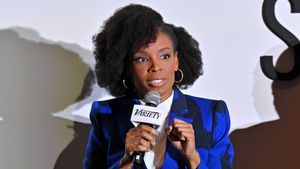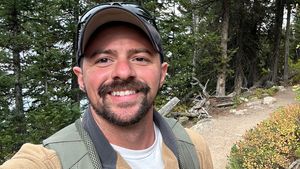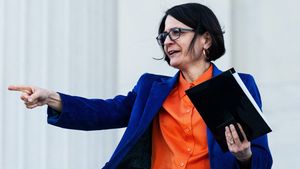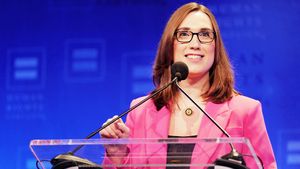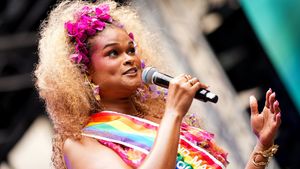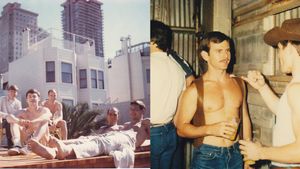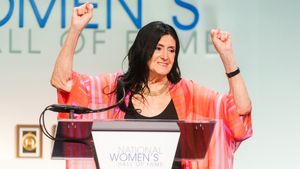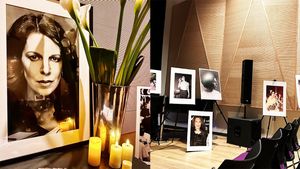All Rights reserved
By continuing to use our site, you agree to our Private Policy and Terms of Use.
These Queer Athletes Changed the Game in 2019

Sports have always been an "American pastime," which means they're representative of our broader culture and politics, as well. That's why it's incredible to think that we may finally be reaching a point where there's a generation of LGBTQ+ athletes who refuse to be sidelined due to their identity. Here, our Champions of the Year.
This piece was originally published in this year's Out100 issue, out on newstands 12/10. To get your own copy directly, support queer media and subscribe -- or download yours for Amazon, Kindle, or Nook beginning 11/21.
Megan Rapinoe

For an athlete who was already one of the most dominant soccer players in history, this was a game-changing year for Megan Rapinoe. The U.S. Women's National Team won its second consecutive World Cup and fourth overall title since 1991, and FIFA awarded Rapinoe, the team's captain, its prestigious Golden Ball and Golden Boot, a pair of honors given to the league's most valuable player and top scorer, respectively. She was also named the league's World Player of the Year. Rapinoe was a fixture in the headlines in 2019 not merely for her commanding gameplay, but also her vocal advocacy. She used her international profile to call out Donald Trump's anti-LGBTQ+ policies after refusing a visit to the White House, and rallied to fight for wage equality (reports indicate that men's championship teams earn about 17 times more than their female counterparts). As the U.S. Women's National Team defeated the Netherlands 2-0, fans chanted "equal pay."Now, the women's players are using that momentum to file a lawsuit against FIFA to be paid the same amount as male athletes. Rapinoe says her big year is just the beginning. "I do think things are changing -- of course, not at the pace I would like -- but there is change happening," she says. "There are important actions being taken. The general public is expressing their support for equal pay, a number of sponsors have actively been involved in working to level the playing field, and calling on leagues and federations alike to address pay inequality, demanding for them to do better." If this year is any indication, Rapinoe's impact can already be felt all over.
Patricio Manuel

When Patricio Manuel defeated super-featherweight Hugo Aguilar in December 2018, the victory had been a long time coming. Manuel, a five-time national amateur boxing champion in the women's league, competed for the U.S. Olympic team in the 2012 trials prior to transitioning. He fought his last match against a woman, a loss to Tiara Brown, the same year. After beginning hormone therapy in 2013, Manuel waited three long years to have a shot in the ring again -- and two more before his first pro match. Manuel's patience paid off. Beating Aguilar in a unanimous decision made him not only the first transgender boxer to compete at the pro level, but the first to win a match. He followed up the groundbreaking achievement with another in 2019, becoming the first transgender man to be featured in an advertising campaign for the popular fitness equipment brand Everlast. "So many people thought it was impossible for a transgender man to beat a [cisgender] man in the ring, and I proved them wrong," he says. Even as Manuel makes history, the 34-year-old says he continues to face challenges as one of the few visibly trans men in pro sports. After transitioning, he lost his coach and his gym, and claims that persistent biases against transgender athletes "make it difficult to find willing opponents" to face off against in the ring. "I had to jump through extra red tape to get my boxing license, and I have to deal with people misgendering me in the media and dismissing me online," he said. "Many people say I'm too weak to fight male-assigned at birth people. Some even say I will likely be killed in the ring because I'm a transgender man, even though cisgender men face the same dangers I do." But after years of battling for a place for himself in his sport, Manuel says he will keep fighting. "I'm ready to get back in the ring and win again," he says.
Brittney Griner

Brittney Griner's WNBA coming out should have changed the game. The center for the Phoenix Mercury opened up about her lesbian identity after she was the number one pick in the 2013 draft out of Baylor University, a Christian school in Waco, Texas, that discourages students from engaging in same-sex relationships. "I knew once I went pro that I was going to talk about it," she says. "Because my journey, it had ups and downs. I went through self-harm for a little bit, and I didn't want anybody that was going through what I went through to feel alone. I just wanted to stand on top of a building and yell out, 'I'm gay!'" Griner's coming out happened just months after Jason Collins became the NBA's first gay player. But while he nabbed a Sports Illustrated cover, the collective reaction to Griner's admission was a shrug. Still, Griner went on to be a six-time WNBA All-Star and the first out LGBTQ+ player to receive an endorsement deal from Nike, but she says female athletes are still battling the perception that they "shouldn't be there." "Change is coming, but we have to demand it," she says. "We can't sit back and wait. We have to go out and take it."
Kerron Clement

Coming out was just the beginning for Kerron Clement. The two-time Olympic gold medalist opened up about his sexuality for the first time in October, which will make the 33-year-old hurdler the only track and field athlete to compete as an out gay man in the U.S. Olympics in 2020. After winning the 400 meter hurdles at the 2016 Olympic games in Rio de Janeiro, Clement hopes to hold onto his title at next year's games in Tokyo. But according to Clement, coming out wasn't about being the "first" at anything. "It's about being transparent and inspiring young athletes to work hard in spite of their struggles," he says. "I went through all the struggles as well, but I worked hard and made a name for myself." Today, Clement is at the top of his game. As LGBTQ+ competitors push athletics to be more inclusive through their existence and persistence, Clement hopes to show others it is possible to beat the odds. "I hope no one has to be afraid anymore," he says. "It's not fair to live in the shadows. Of course everyone's experiences are different, but I hope I can give one person the courage to live their lives fully. You have to live for yourself and not for others. Don't stifle yourself anymore."
Ryan Russell

In August, the 27-year-old defensive end Ryan Russell came out as bisexual in a letter published by ESPN. "Today, I have two goals: returning to the NFL, and living my life openly," he wrote. "I want to live my dream of playing the game I've worked my whole life to play, and being open about the person I've always been." But after becoming one of the only NFL players to ever come out as queer -- a shortlist that includes Michael Sam and Ryan O'Callaghan -- he wants to set himself apart by being the first to get playing time. No out player has ever taken a down in the league, and Russell, a free agent since parting ways with the Buffalo Bills in 2018, says he's "more physically prepared than ever" to be that person. "If you're using any of your mental capacity on something other than sports, it's hard to succeed," he says. Although players and coaches often believe drafting a queer player will be a "distraction," Russell believes prospective teams would only benefit from having him bring all of himself to the game. "To know that your teammates know you fully and support you is a strength that can only lead to success," he says.



























